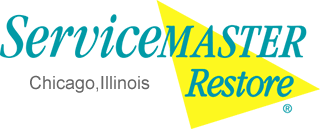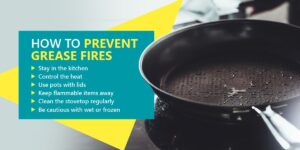
Dealing with hot appliances and oils can lead to accidents like grease fires. Stopping a grease fire requires a different approach than other kinds of fires — learning how to put one out will help you stay calm and ensure the safety of you and your home.
What Causes a Grease Fire?
Grease fires happen when cooking oil or fats get too hot and ignite. When oil reaches its flashpoint — typically around 600 degrees Fahrenheit — it can catch fire. A grease fire can start when oil is left unattended on high heat and overheats in a pan or splatters onto the stove’s burner.
Common cooking oils such as vegetable oil, olive oil and even butter have relatively low flash points and smoke points, making them prone to grease fires. Cookers are one of the most common causes of house fires, but other sources include heating, electrical systems, candles and dryers.
What Happens if You Put Water on a Grease Fire?
Putting water on a grease fire is extremely dangerous and can worsen the situation. When water is poured on burning oil, it instantly vaporizes into steam. This rapid conversion causes the hot oil to splatter, spreading the fire and potentially causing severe burns or injuries. The steam also displaces the oxygen needed for the fire to burn, letting more oxygen rush in and creating a dangerous cycle that intensifies the flames.
How to Prevent Grease Fires
If you want to reduce your chances of dealing with a dangerous grease fire, you need to work on preventing it. Proper grease fire prevention will help keep you safe and protect your home from unwanted fire damage. The more vigilant you are, the less likely you are to have to deal with a grease fire. Use these steps to keep your kitchen safe and prevent grease fires from starting:
- Stay in the kitchen: Make sure your cooking is always supervised, especially when using hot oil or frying foods. Keeping a close eye on the stove can help you catch any potential problems early and prevent a grease fire from starting.
- Control the heat: Keep the heat at a medium to low setting when frying foods to avoid overheating the oil. If you notice the oil beginning to smoke, turn off the heat immediately and let it cool down before resuming cooking.
- Use pots with lids: Using lids when you cook with pots on the stovetop provides a handy tool for smothering the fire. Secure lids can help cover and put out the flame in the event of a grease fire.
- Keep flammable items away: Keep flammable items like paper towels, oven mitts and dish towels far from the stove. These items can easily catch and spread the fire if they come into contact with hot oil or an open flame.
- Clean the stovetop regularly: Grease and food particles that accumulate on the stovetop can ignite if they get too hot. Regularly clean the stovetop and surrounding areas to prevent grease buildup.
- Be cautious with wet or frozen foods: Avoid placing wet or frozen foods directly into hot oil, as this can cause splattering and increase the risk of a grease fire. Thaw and dry foods before frying them.
How to Stop a Grease Fire
Fires can still happen even with all the proper grease fire protection practices. Hot cooking oil can be challenging, and sometimes grease fires are unavoidable. It’s vital you know how to put them out so you can protect yourself and your home from harm. If you ever find yourself facing a grease fire in the kitchen, you’ll need to understand how to handle them as quickly and safely as possible.
Here’s a step-by-step guide on what to do if a grease fire occurs:
- Stay calm and act fast: The first thing to remember is to stay calm. It can be scary to see flames suddenly erupt on the stove, but panicking will not help. Take a deep breath and act quickly to prevent the fire from spreading.
- Turn off the heat: When you notice a grease fire, turn off the stove’s heat source. If you can safely reach the stove knobs, turn them off. Stopping the heat will remove the fire’s main fuel source, helping to slow down its growth.
- Cover the flames: Grab a metal lid or cookie sheet that is larger than the pan on fire. Carefully slide the lid or cookie sheet over the pan to cover the flames entirely. Don’t plop the lid on top — you’ll leave oxygen under the lid to fuel the fire. Sliding the lid on top cuts off the fire’s oxygen supply, which is necessary for it to keep burning. Keep the lid on the pan until the fire is entirely out. Avoid using glass lids, as they could shatter due to the intense heat.
- Use baking soda: If you don’t have a lid or cookie sheet, another option is to use baking soda to put out the grease fire. Grab a box of baking soda and sprinkle a generous amount directly onto the flames. Baking soda can smother the fire, halting its spread. Keep adding more baking soda until the flames subside.
- Never use water: Water and grease do not mix and pouring water on a grease fire is extremely dangerous. Adding water to a grease fire will cause the hot oil to splatter and spread the fire rapidly. Never use water as a way to put out the grease fire.
- Avoid carrying the pan: Avoid carrying the flaming pan outside or to the sink. Moving the pan can spread the fire, and you may get hurt in the process. It’s best to leave the pan where it is and deal with the fire using the above methods.
- Use a fire extinguisher: Having a fire extinguisher rated for Class B fires, which includes grease fires, is a smart addition to your kitchen safety measures. Learn how to use the fire extinguisher beforehand so that you can act confidently and quickly in case of an emergency.
- Call for help: If the fire is getting out of control, don’t hesitate to call for help. Shout out to alert others in the house and make sure everyone evacuates to a safe location outside. Dial emergency services, like 911, to summon professional firefighters who are trained to handle fires.
Fix Fire Damage With ServiceMaster of Lincoln Park
Knowing how to stop grease fires is essential for anyone who cooks. If the fire spreads and damages your home, you need to turn to trusted experts to repair the damage.
ServiceMaster of Lincoln Park delivers professional fire restoration services so you can get your home back after a grease fire. With 24/7 emergency services, you can get the help you need when you need it. Our thorough wall and ceiling cleaning will make your home smoke and fire-free, restoring your space and your peace of mind. If you need fire damage repairs, contact us online to get started today!



